Earlier this month, With/out Pretend and The Vault released a special print edition of On Pleasure, a collection of poetry, creative prose, visual art, and honest conversation about pleasure. To celebrate, on March 13th, they’re hosting an intimate evening of storytelling featuring ten guests who will speak about their own relationships to pleasure. At the event, Jaime Eisen, Maria Isabela Martinez, Andrea Werhun and Farrah Abdel-Latif will be offering their own unique perspectives. We chatted with them more to find out what they have in store.
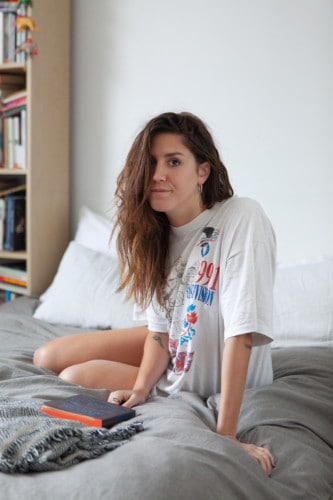
Jaime Eisen. Photo by Angela Lewis
Jaime Eisen
@smalltits.bigheart
Jaime Eisen is a cam girl and a co-founder of gf content, a PR firm that focuses on a highly personal, collaborative approach to public relations. A hardcore nerd who talks too much, she has put these traits to good use, working extensively to build relationships and start conversations about brands and issues that matter.
SDTC: How has your attitude towards your own pleasure changed over time?
JE: For a long time, I had a really difficult relationship with pleasure, especially sexual pleasure. For so long, the pleasure I felt in sex was separate from my body, but rather was grounded in the shame or validation I felt from others. I used sexual pleasure as a means of controlling or neutralizing a profound sense of loss.
Being a cam girl has complicated this relationship even further; I often conflate my pleasure with that of my followers or the people in my room. That said, camming has also been a wonderful outlet for rediscovering a home in my body, developing a supportive community, and challenging the feelings of shame I’d almost habitually associated with experiencing pleasure.
Where do you find the most pleasure nowadays?
Reading and being around the people I love, sunshine, my LELO SONA (if you don’t know, now you know).
Who or what has shaped your views on pleasure the most, and how?
My own curiosity is pretty insatiable, and I think experiences have largely shaped my personal feelings about pleasure. But pleasure is political, and that’s often overlooked. I think it’s essential to think and talk about who gets to experience pleasure and how. How can we work to close that gap?
Sex workers and activists (like Andrea!) are at the forefront of discussions about the complexities of pleasure, and how it coincides with gendered labour.
What can we look forward to at your talk for On Pleasure?
People can definitely look forward to me being deeply awkward and gushing over the other amazing speakers.
Tips for others wanting to reconnect with pleasure in their lives?
Take the time to develop an honest and loving relationship with your body. Be patient with yourself. Have fun!
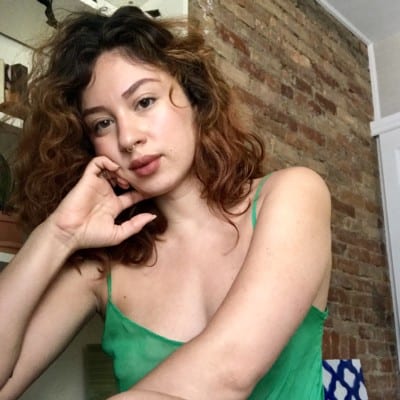
Maria Isabela Martinez
Maria Isabela Martinez
.@maisamar_
Maria Isabel Martinez (she/her) is a writer born and living in Toronto. She is an impatient and honest Aries. Her work explores the politics of healing and care, intimacy, sexuality and the feminine. Her work has appeared in Ephemera Magazine, Koffler.Digital, cléo journal, Noisey Music and now The Vault. Maria is speaking at the March 13th event and she has also written a touching personal essay called “Queen Pleasure” in the new issue of On Pleasure.
How has your attitude towards your own pleasure changed over time?
Well first of all, I finally know what makes me feel good. Which is such a fun place to be. I know what I need and I do it, or ask people to do it for me. That’s another thing, I ask.
I used to be afraid of my pleasure, afraid that people wouldn’t be willing to offer it to me. I accepted the lie that my desires as a queer and Latinx person from a wild and poor family were too big and too much, so I shrank from them.
Right now I find myself with some core starting points, and I’m excited to see what they grow into throughout my life.
Where do you find the most pleasure nowadays?
I create pleasure in my every day: meals, music, scent, my relationships; sex and self-pleasure, of course; moving my body, sweating, candlelight, sunlight.
I love when someone treats me in a way I haven’t been treated before and it prompts me to be like, “Oh yes, I want more of this.” Having lovers and friends who care about my pleasure shapes how I approach it for myself.
Most of all, I perform rituals of care that sustain me and my joy. I work to develop a life that brings me pleasure in every moment. This isn’t always possible, and it requires a lot of effort. It has also meant sometimes making decisions that are difficult in the moment.
Who or what has shaped your views on pleasure the most, and how?
As someone who has lived through various traumas, and not really been given healthy models of pleasure throughout my life, beginning to heal those traumas and my psychosomatic self has shaped my view and experience of pleasure. I can’t separate my pleasure from my healing anymore.
Pleasure is so personal. There are tons of writers and artists who inform my thinking—resilient, unabashed, and sensual women especially. Special mentions to Rihanna, Audre Lorde, my friend and artist Debby Friday, a few sex workers. I learn a lot from Indigenous and Black queer and feminist thought. But exactly how I perceive and create my pleasure is mine.
What can we look forward to hearing you talk about at On Pleasure?
Haha, um…a story I haven’t told before. A story about women, intimacy, releasing shame. It’s new and a little scary, but it’s time. I’m excited to share it in this space.
Tips for others wanting to reconnect with pleasure in their lives?
Allow yourself to fail at finding it, and honour the moments that don’t bring pleasure directly or immediately. There is richness and information in the things that don’t make us feel good. I mean, don’t seek them out, but don’t reject them when they come. We can only know what we want if we are aware of what we do not want. I learned a lot about what brings me peace and joy by meeting exactly what I didn’t want, and moving in another direction.
Also—and this is important for me—demand your pleasure. Not out of entitlement, but out of self-preservation.
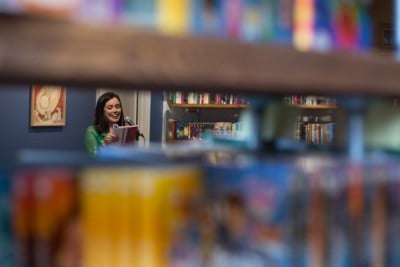
Andrea Werhun. Photo by Nasuna Stuart-Ulin
Andrea Werhun
@weenerwoman
Andrea Werhun is a writer, performer, and forever sex worker. She is the co-creator and author of Modern Whore: A Memoir, a collection of short stories and photography in collaboration with filmmaker Nicole Bazuin. Find her naked in the current issue of Playboy, accompanied by her essay on the ethics of posing nude while feminist in the #MeToo era.
When she’s not taking her clothes off for money, Andrea is a Peer Outreach Worker at Maggie’s: Toronto Sex Workers Action Project, where she teaches sex workers, through creative writing, to see themselves as the heroes and heroines of their own journeys. She’s been interviewed and featured by The New York Times, The Guardian, The Daily Mail, VICE, CBC and Hazlitt. Andrea is working on her next book about her current stripping career.
How has your attitude towards your own pleasure changed over time?
I have always loved pleasure. Feeling good, chasing my dreams, indulging in my desires: as a rule, I prioritize my pleasure. What I’ve learned, however, is that sometimes in my pursuit of pleasure, I hurt the people I love. If I’m always prioritizing my pleasure, whose pleasure is being subjugated? Who bows down to my will? Who feels bad so I can feel good?
Pleasure is a privilege, one that wears rose-coloured glasses. Whose emotional labour do I take for granted in my quest for pleasure? Mutual pleasure must be the priority. I’ve been a “giver” and I’ve been a “taker” of pleasure. It’s a long road to meet the two.
Where do you find the most pleasure nowadays?
A big winter-swollen squirrel in the snow. Dancing alone. Pushing through the slog and completing a first draft of anything. My boyfriend’s laugh and my wife’s smile. The warmth and shelter under my duvet. Squirting and scheming. My peer outreach work with Maggie’s. Bearing witness to the greatness of sex workers. Live music. Finishing a good book. Recording my dreams–the kind I have at night. Conversation with kindred spirits. Love.
Who or what has shaped your views on pleasure the most, and how?
When I studied Mary Wollstonecraft’s proto-feminist A Vindication of the Rights of Woman (1792) in school, she taught me to prioritize equality in the pursuit of sexual and intellectual pleasure; to focus on friendship in romantic relationships; that women ought to “go for it,” just as much as men. She didn’t have the opportunity to pursue her feminist ideals of equality in late eighteenth-century England, but here and now, I do. I chase pleasure like I’m about to burned at the stake.
What can we look forward to hearing you talk about On Pleasure?
While I can make no promises on the final draft at this stage, I can tell you I’ve been dwelling on the performance of pleasure as both a sex worker and as a woman who identifies as a “giver,” as well as the privilege of pleasure as the beneficiary of a supportive partner whose emotional labour I have taken for granted. Another big question I have been asking is, “What happens when the selfless sex goddess becomes selfish, and how is the natural order of the world restored?”
Tips for others wanting to reconnect with pleasure in their lives?
Listen to your gut, listen to your heart: you know the truth. Spend time alone. Cry cry cry it out. Write to discover what you think. Stand up for your pleasure. Challenge the idea that “a man comes first.” Choose pride over shame. Self-care the fuck outta yourself. Taste everything.
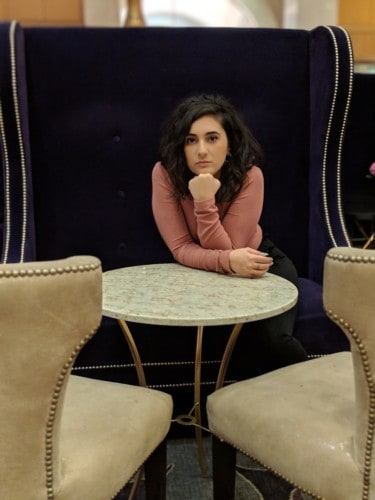
Farrah Abdel-Latif
Farrah Abdel-Latif
Farrah Abdel-Latif is an Egyptian-Canadian Muslim with an MA in English Literature, Print Culture and Book History from the University of Toronto. When she is not paused in awe of the universe, she is a writer, a tutor, an astrologer, a tarot reader, and a medium.
How has your attitude towards your own pleasure changed over time?
When I was young, I was openly wild. I was more sexually curious than most of my peers, and I was not afraid to show it. In kindergarten, I tempted my boy friends to show me their private parts. In exchange I would show them mine. When we got caught, they ratted me out as the mastermind. That night, I heard my parents bemoan the daughter God had given them. “How are we going to control her?” my dad asked, and would ask over and over again.
In high school, I became more courageous. More blunt. More raw. I openly spoke of sexcapades in high school halls. In English class, I wrote only on the explicit, the taboo, the erotic. My vehement search for pleasure was both visceral and intellectual. I had to touch it, taste it, smell it, read it, write it, be it. But at home I was quiet. My dad was constantly plotting to confine me into expectations, so I continuously worked to convince him I was meeting them. Life became lies. No talk of my bisexuality. No talk of my boyfriends that didn’t have a stamp of approval. No talk.
As a Muslim-Egyptian woman, I have learned the necessity of secrecy when it comes to my expression of pleasure. Anything outside of what is permissible is neatly tucked under the image of my self. Even writing is risky. In corners and safe spaces, I am pleasure’s open book. In family-dominated places, I am its locksmith.
Where do you find the most pleasure nowadays?
Writing wild thoughts. People like me, who are not culturally or religiously granted sexual freedom, often turn to art to express those emotions we repress, hide, let die in closets. Writing brings me to light. Makes my pleasure visible to the mind, even if it cannot be seen in the flesh.
Who or what has shaped your views on pleasure the most, and how?
My grandmother. My matriarch. My belly-dancing teacher. My favourite poet. A three-time Egyptian divorcee who married at fifteen years old, simply because her father would not let her wear high heels until she was wed. She had to have the heels, so she accepted the husband. She curses all three exes now, but never regrets her love affair with heels. “Men, screw them,” she says slyly, between pulls of her cigarette. I laugh at her recurring double entendre. “They’re dirty anyway, khara!” She glares as she spits her words.
My grandmother and I share the same birthday. I am a reiteration of her energy. An extension of her soul. And a repercussion of my mother’s shame towards her mother. My mother would not accept her mother’s sensuality, so the universe replicated it in a daughter. My grandmother’s quest for pleasure is the framework for my own sensual search.
What can we look forward to hearing you talk about On Pleasure?
My grandmother, myself, and the generational trauma that binds us. The painful pleasure that confines us. Polygamy, secrecy, cultural indecency. And poetry’s capacity to set our mind’s free despite the incarceration of our bodies.
Tips for others wanting to reconnect with pleasure in their lives?
Do not let anyone dictate your personal expressions of pleasure. If you can. If you cannot, I understand. Sometimes secrecy saves lives.


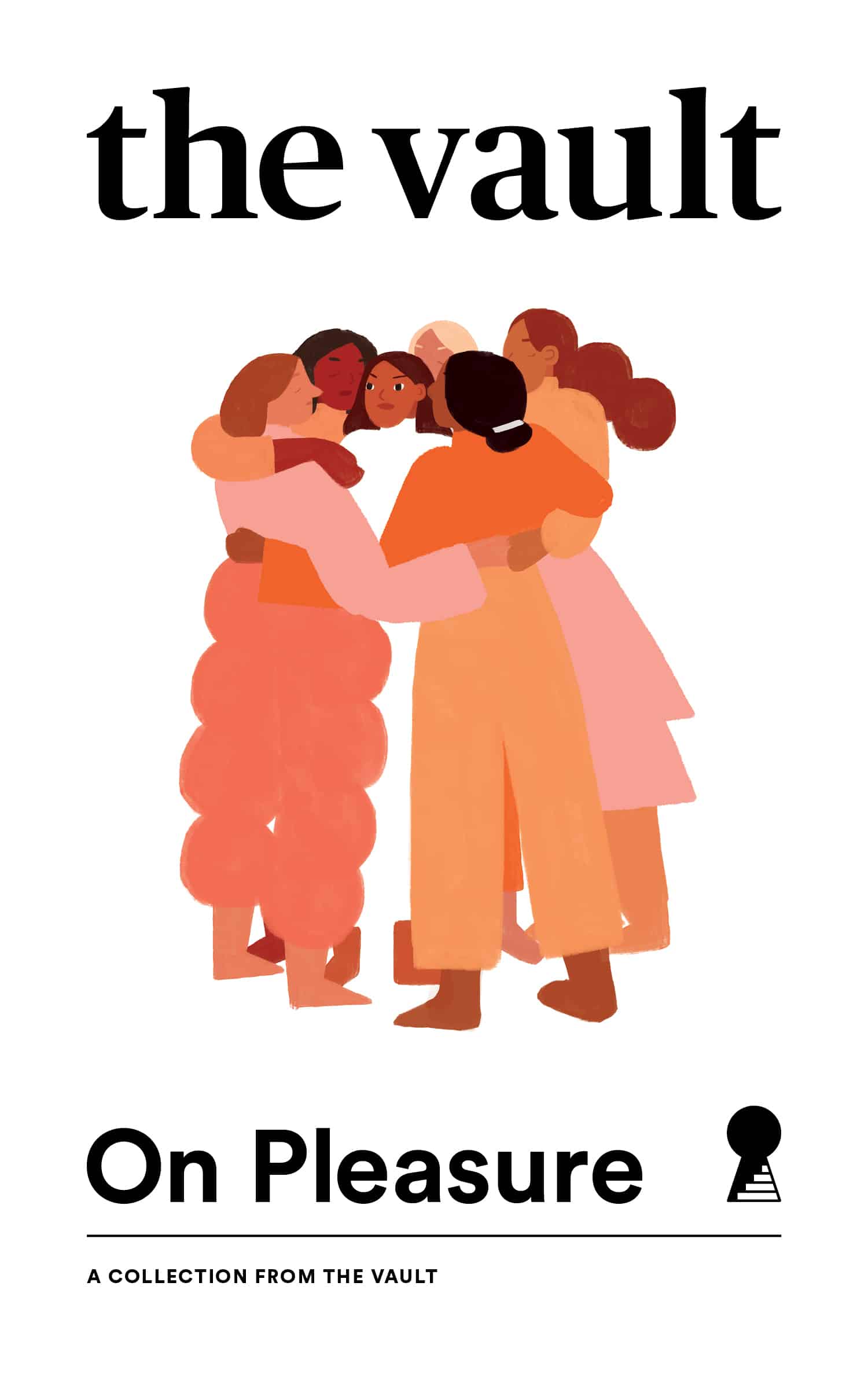
 Follow Us On Instagram
Follow Us On Instagram
